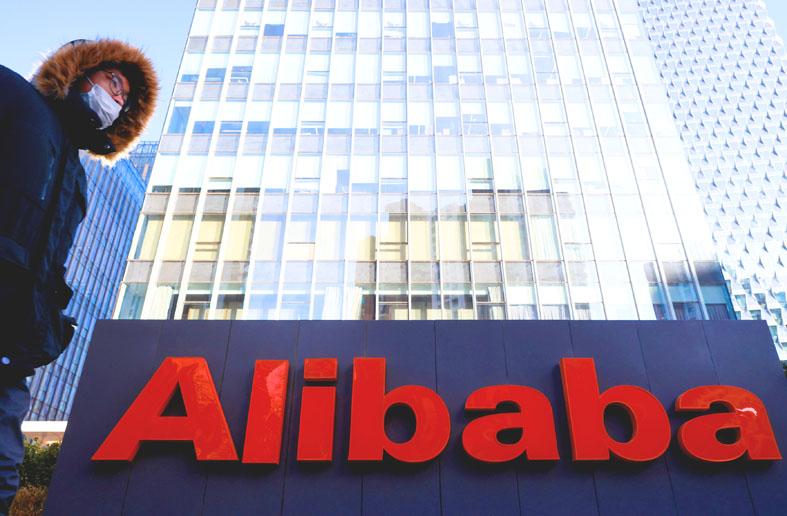China’s largest e-commerce group Alibaba Group Holding Ltd (阿里巴巴) yesterday said it is appointing a new chief financial officer and reorganizing its e-commerce businesses amid a regulatory crackdown in the technology industry.
Toby Xu (徐宏) is to succeed Maggie Wu (武衛) as its new CFO from April 1 next year, the company said in a statement.
Xu joined Alibaba from PricewaterhouseCoopers LLP three years ago and was appointed deputy group CFO in July 2019.

Photo: Reuters
Wu, who has been Alibaba’s CFO since 2013 and has helped lead three Alibaba-related company listings, would continue to serve as an executive director on Alibaba’s board.
She would also remain as a partner in the Alibaba Partnership — a group of senior executives who have the right to nominate a simple majority of Alibaba’s board of directors.
“We are focused on the long-term, and succession within our management team on every occasion is always in the service of ensuring Alibaba will be stronger and better positioned for the future,” Alibaba chairman and chief executive officer Daniel Zhang (張勇) said.
Separately, Alibaba said that it would be creating an international digital commerce team to handle its e-commerce businesses in international markets.
A China digital commerce team would be in charge of e-commerce operations inside China, a post on the company’s Alizila news hub said.
The Hangzhou-based firm was fined a record US$2.8 billion for antitrust contraventions and is under scrutiny as regulators step up oversight of the technology industry at a time when the economy is slowing.
Last month, Alibaba cut its sales outlook for the year amid mounting competition from rivals such as Pinduoduo Inc (拼多多). It expects growth for this year to be the slowest since it listed on the New York Stock Exchange in 2014.
Alibaba’s New York stock price has plunged more than 50 percent over the past 12 months. The company’s Hong Kong-traded shares were down 4.9 percent yesterday.

SEEKING CLARITY: Washington should not adopt measures that create uncertainties for ‘existing semiconductor investments,’ TSMC said referring to its US$165 billion in the US Taiwan Semiconductor Manufacturing Co (TSMC, 台積電) told the US that any future tariffs on Taiwanese semiconductors could reduce demand for chips and derail its pledge to increase its investment in Arizona. “New import restrictions could jeopardize current US leadership in the competitive technology industry and create uncertainties for many committed semiconductor capital projects in the US, including TSMC Arizona’s significant investment plan in Phoenix,” the chipmaker wrote in a letter to the US Department of Commerce. TSMC issued the warning in response to a solicitation for comments by the department on a possible tariff on semiconductor imports by US President Donald Trump’s

The government has launched a three-pronged strategy to attract local and international talent, aiming to position Taiwan as a new global hub following Nvidia Corp’s announcement that it has chosen Taipei as the site of its Taiwan headquarters. Nvidia cofounder and CEO Jensen Huang (黃仁勳) on Monday last week announced during his keynote speech at the Computex trade show in Taipei that the Nvidia Constellation, the company’s planned Taiwan headquarters, would be located in the Beitou-Shilin Technology Park (北投士林科技園區) in Taipei. Huang’s decision to establish a base in Taiwan is “primarily due to Taiwan’s talent pool and its strength in the semiconductor

An earnings report from semiconductor giant and artificial intelligence (AI) bellwether Nvidia Corp takes center stage for Wall Street this week, as stocks hit a speed bump of worries over US federal deficits driving up Treasury yields. US equities pulled back last week after a torrid rally, as investors turned their attention to tax and spending legislation poised to swell the US government’s US$36 trillion in debt. Long-dated US Treasury yields rose amid the fiscal worries, with the 30-year yield topping 5 percent and hitting its highest level since late 2023. Stocks were dealt another blow on Friday when US President Donald

UNCERTAINTY: Investors remain worried that trade negotiations with Washington could go poorly, given Trump’s inconsistency on tariffs in his second term, experts said The consumer confidence index this month fell for a ninth consecutive month to its lowest level in 13 months, as global trade uncertainties and tariff risks cloud Taiwan’s economic outlook, a survey released yesterday by National Central University found. The biggest decline came from the timing for stock investments, which plunged 11.82 points to 26.82, underscoring bleak investor confidence, it said. “Although the TAIEX reclaimed the 21,000-point mark after the US and China agreed to bury the hatchet for 90 days, investors remain worried that the situation would turn sour later,” said Dachrahn Wu (吳大任), director of the university’s Research Center for